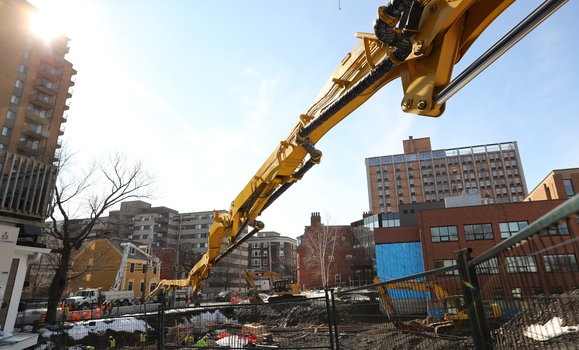News
» Go to news mainIDEA Project Update

With files from Ryan McNutt and Matt Semansky
Every great advance, every big step forward, begins with an idea ã or, in the case of ôÕѿǨû§ãs downtown Halifax campus, an ãIDEA.ã
The acronym ã which stands for ãInnovation and Design in Engineering & Architectureã ã is a familiar one to many in the Dal community. For several years, itãs been used to describe planned future development on Sexton Campus to support Dalãs Faculties of Engineering and Architecture & Planning.
Now, the IDEA Project, ä»has grown into a massive $64-million investment in Dalãs downtown campus, thanks to support from donors, industry and the Government of Canada.
The IDEA Project, which began construction in the Fall of 2016, will not only revitalize Sexton Campus but truly transform it, making it the heart of Halifaxãs emerging innovation district.
THREE PILLARS FOR TRANSFORMATION
There are three core elements to the full scope of the IDEA project: new buildings; research and outreach hubs; and sustainability investments.
Two new academic buildings, totaling 86,000 sq. feet, will stretch across Sexton Campus from Morris Street towards the Halifax Central Library. The first, called the ãEmera IDEA Buildingã, will feature five state-of-the-art, student-centred workshops (including machine, working and prototyping shops) and a dedicated space to support both student entrepreneurship and external startups and industry.
The second, known as the ãDesign Building,ã will include a 450-seat auditorium and four new design studios for Architecture and Planning students. It will also be the future home for Dalãs masterãs programs in Landscape Architecture (Halifax) and Community Design. The buildings will also support technology diversity programs.
The IDEA Project will also include R&D infrastructure renewal to create research and outreach hubs around three sectors: clean tech, oceans tech and advanced manufacturing. These hubs will provide faculty, students and industry/entrepreneurs alike with space and facilities for applied research, product development, collaboration and commercialization. The three areas not only align with the skills of Dalãs researchers, but are all key sectors for Nova Scotia and the region: advanced manufacturing, for example, represents the largest output of any goods-producing sector in Nova Scotia ($2.7 billion in GDP), while revenues from the provinceãs ocean tech sector has doubled in recent years.
One of the hubs that will be introduced will be the Emera ideaHUB: a working space designed to equip students with creative and entrepreneurial skills while also providing support to local start-up companies and small businesses. Housed in the Emera IDEA Building, theEmera ideaHUB is a partnership linking universities (including Acadia and NSCAD) with the corporate sector, entrepreneurs, venture capital and government.
The final element of IDEA is a set of sustainability programs that will enhance and support research opportunities while reducing greenhouse gas emissions and improving efficiency. These include a geothermal energy field to provide heating/cooling, solar PV installations, a green-roof teaching lab and more.ä» ä»ä»
A targeted completion date for the IDEA Project is spring 2018.
Take a look at some of our construction timeline photos:
EMERA IDEA BUILDING
A rendition of the exterior of one of two new buildings of the IDEA Project, dubbed the ãEmera IDEA Building,ã as viewed from behind Gerrard Hall.
A birdãs eye view of the building site. April 17
Handling the concrete shoot to pour the footings. February 2
Pouring the buildingãs first walls, with a 42m pump truck. February 24
The foundation walls are formed with a preinsulated system called Thermomass. March 30
ä»
DESIGN BUILDING
A rendition of the exterior of one of two new buildings of the IDEA project, dubbed the ãDesign Building.ã
The 450 seat auditorium is taking shape. April 17
Extending the pump arm to pour the first walls. February 24
The walls for the core stairwell are half formed. March 7
Site preparation for the foundation of the new 450 seat auditorium. March 13
Recent News
- Engineering Young Alumni Reception
- Students scale new heights with Toronto tower pitch
- ôÕѿǨû§ Students Develop Automation Tool for Irving Shipbuilding
- 2025 Capstone Poster Expo
- ôÕѿǨû§ Engineering Students Lead the 2025 Canadian Engineering Competition
- ãA painless flash of lightã: Biomedical Engineering student wins 3 Minute Thesis
- Sparking a Passion for Indigenous Engagement in Engineering
- 2025 Engineering Student Experience Showcase
